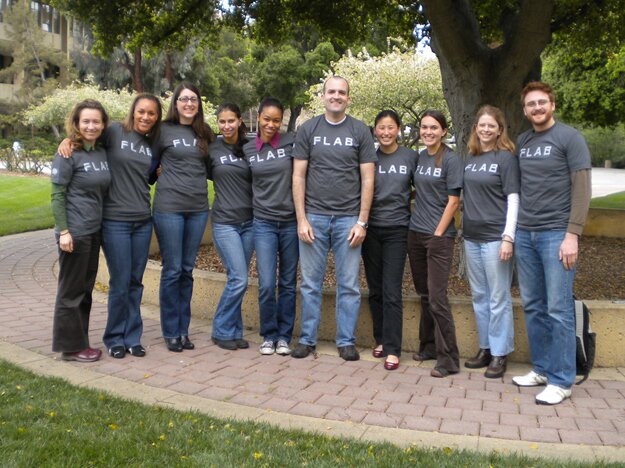FLAB
FLAB (Flynn-LAB) is a workshop for Ph.D. students pursuing a degree in Organizational Behavior or a related field. Our discussions cover a broad range of topics, including pro-social behavior, the meaning of work, and sources of power and leadership in organizations. Aside from developing our own streams of research, the lab focuses on educating students about research design, empirical methods, and scientific writing. To this end, we often invite guest speakers to attend and share specialized content.

Recent work by FLAB students
Rebecca Schaumberg
Guilt is Good
 We posit that guilt plays a positive role in the workplace. Specifically, we find that the personality trait of guilt-proneness motivates employees to work hard on their tasks, perform well in their jobs, and feel committed to their employers. Although often described as a dysfunctional affective experience, guilt can be highly energizing, particularly for those individuals who are inordinately prone to experience it. To examine the benefits of guilt-proneness, we have collected data from several field sites, including a software development firm, a mid-sized regional bank, and a small healthcare provider, and conducted several laboratory experiments. The evidence clearly suggests that those employees who are more guilt-prone work harder, perform better, and exhibit higher levels of commitment to the firm relative to those who are less guilt-prone. In short, it seems that guilt is good, particularly when one feels guilty on the job.
We posit that guilt plays a positive role in the workplace. Specifically, we find that the personality trait of guilt-proneness motivates employees to work hard on their tasks, perform well in their jobs, and feel committed to their employers. Although often described as a dysfunctional affective experience, guilt can be highly energizing, particularly for those individuals who are inordinately prone to experience it. To examine the benefits of guilt-proneness, we have collected data from several field sites, including a software development firm, a mid-sized regional bank, and a small healthcare provider, and conducted several laboratory experiments. The evidence clearly suggests that those employees who are more guilt-prone work harder, perform better, and exhibit higher levels of commitment to the firm relative to those who are less guilt-prone. In short, it seems that guilt is good, particularly when one feels guilty on the job.
Gabe Adams
The Gifts We Keep on Giving
 We examine the process of gift-giving and the mistakes people make when trying to give “the perfect gift.” In a previous paper, we found that gift-givers were inclined to believe that gift price was closely correlated with feelings of appreciation, but in fact there was no correlation between gift price and recipients’ actual feelings of appreciation. To wit, money can’t buy love, and gift-givers would do well to purchase more thoughtful gifts, rather than more expensive ones. Building on this work, we also examine (with Mike Norton) the practice of “regifting” and suggest it may not be as offensive as many people assume. In our studies, participants who imagined regifting a present thought the initial giver would be more offended than givers actually reported feeling. What drives this effect? Our data suggest that people feel constrained – even though they are the recipient of the gift, they still have to use the gift in the way the giver intended (but gift-givers disagree with this view). To remove this feeling of constraint, in a final study, we tell them that it’s “National Regifting Day,” and indeed they feel less constrained in this case and more willing to regift than had it been a different day.
We examine the process of gift-giving and the mistakes people make when trying to give “the perfect gift.” In a previous paper, we found that gift-givers were inclined to believe that gift price was closely correlated with feelings of appreciation, but in fact there was no correlation between gift price and recipients’ actual feelings of appreciation. To wit, money can’t buy love, and gift-givers would do well to purchase more thoughtful gifts, rather than more expensive ones. Building on this work, we also examine (with Mike Norton) the practice of “regifting” and suggest it may not be as offensive as many people assume. In our studies, participants who imagined regifting a present thought the initial giver would be more offended than givers actually reported feeling. What drives this effect? Our data suggest that people feel constrained – even though they are the recipient of the gift, they still have to use the gift in the way the giver intended (but gift-givers disagree with this view). To remove this feeling of constraint, in a final study, we tell them that it’s “National Regifting Day,” and indeed they feel less constrained in this case and more willing to regift than had it been a different day.
Kieran O’Connor
Big is Bad
 Do people believe that organizations are ethical? It may depend on the size of the firm in question. In a series of studies, we identified a lay belief that large organizations are less ethical than small organizations. In one study, people assume that the size of an actual organization (e.g., British Petroleum) is negatively related to its ethical integrity. In a pair of follow-up studies, we manipulate organizational size and elicit stronger unethical judgments for larger organizations engaging in both unethical and ethical behavior. Results from a fourth study indicate that the effect is bidirectional: less ethical firms are perceived to be larger. In a fifth study, we find that even minimal cues (photographs of office buildings) are enough to evoke these negative impressions. A final study demonstrates that people joining larger firms are viewed as no less ethical than those joining smaller firms, but over time, the former will tend to show greater evidence of moral corruption.
Do people believe that organizations are ethical? It may depend on the size of the firm in question. In a series of studies, we identified a lay belief that large organizations are less ethical than small organizations. In one study, people assume that the size of an actual organization (e.g., British Petroleum) is negatively related to its ethical integrity. In a pair of follow-up studies, we manipulate organizational size and elicit stronger unethical judgments for larger organizations engaging in both unethical and ethical behavior. Results from a fourth study indicate that the effect is bidirectional: less ethical firms are perceived to be larger. In a fifth study, we find that even minimal cues (photographs of office buildings) are enough to evoke these negative impressions. A final study demonstrates that people joining larger firms are viewed as no less ethical than those joining smaller firms, but over time, the former will tend to show greater evidence of moral corruption.